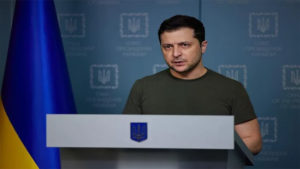 Ukrainian officials and two Republican members of Congress have pushed for the United States to implement a no-fly zone as Russia’s invasion continues, but doing so would mark a major escalation in the war.
Ukrainian officials and two Republican members of Congress have pushed for the United States to implement a no-fly zone as Russia’s invasion continues, but doing so would mark a major escalation in the war.
Ukrainian President Volodymyr Zelensky, via a statement to Axios on Monday, called on President Biden and NATO to impose a no-fly zone over “significant parts” of his country, saying that “if the West does this, Ukraine will defeat the aggressor with much less blood.” Zelensky tweeted Tuesday morning that he had told German Chancellor Olaf Scholz that Europeans supporting Ukraine needed to “close the sky.”
In an interview with MSNBC’s “Morning Joe” on Tuesday, Ukrainian lawmaker Oleksandra Ustinova continued to make the case.
“We need to protect our sky, and that’s why we need a no-fly zone,” Ustinova said. “I know this is something that nobody wants to talk about because everybody is scared of Vladimir Putin. … My only question here to the international community would be, what is the red line for him? What is the red line when you actually step in? How many children have to die?”
On Friday, Rep. Adam Kinzinger, R-Ill., called for the implementation of a no-fly zone, stating that it would “disrupt Russias air [operations] to give the heroic Ukrainians a fair fight. It’s now, or later.”
Sen. Roger Wicker, R-Miss., joined him on Monday.
“Clearly, in the absence of a U.N. resolution, which Russia would veto, a strong coalition of like-minded nations should step in and seriously consider this,” Wicker told HuffPost in an interview.
“Tens of thousands of women and children fleeing from Kyiv west have created a humanitarian situation that the international community needs to step in and be involved in,” he added. According to the United Nations, more than 100 civilians have already been killed since Russia launched its invasion last week, although the real number could be higher than that.
To actually enforce a no-fly zone, NATO would likely need to shoot down any Russian aircraft that violated the declaration, an open attack on a nation with nearly 6,000 nuclear weapons. (On Monday, Biden said Americans should not be worried about nuclear war with Russia.)
The U.S. and its allies have implemented multiple no-fly zones in recent decades over countries with much less powerful militaries, such as Saddam Hussein’s Iraq in the 1990s and Libya in 2011.
The concept of a no-fly zone over Ukraine appears to have gained no traction with the Biden administration. Press secretary Jen Psaki said at Monday’s White House briefing that implementing one would require “deploying U.S. military to enforce, which would be … potentially a direct conflict, and potentially a war with Russia, which is something we are not planning to be a part of.”
During Monday’s Department of Defense briefing, a reporter asked Pentagon press secretary John Kirby whether mounting civilian casualties could lead the U.S. to implementing a no-fly zone. Kirby answered, “No,” and moved on with the briefing.
There was bipartisan support of that position from Capitol Hill.
“There’s been a lot of loose talk from smart people about ‘close air support’ and ‘no fly zones’ for Ukraine,” Sen. Chris Murphy, D-Conn., tweeted. “Let’s just be clear what that is — the U.S. and Russia at war. It’s a bad idea and Congress would never authorize it.
“Military equipment for Ukraine, humanitarian support for Ukraine, crippling sanction on Russia, movement of U.S. troops to the eastern flank of NATO — these are all the right moves,” he continued. “But direct war between the world’s two nuclear powers should be a non-starter.”
“People have to understand what that means,” Sen. Marco Rubio, R-Fla., told reporters Monday evening when asked about the possibility of a no-fly zone. “That means a willingness to shoot down Russian planes. And that would mean World War III.”
International allies in Europe also ruled out the possibility. United Kingdom Defense Secretary Ben Wallace said last week that implementing a no-fly zone would put “British fighter jets directly against Russian fighter jets” and that “NATO would have to effectively declare war on Russia because that’s what you would do.”
“We have no intentions of moving into Ukraine, neither on the ground or in the airspace,” NATO Secretary-General Jens Stoltenberg told NBC News in a Monday interview. “We have a responsibility to make sure that this doesn’t spiral out of control and escalate even further into concern for full-fledged war in Europe involving NATO allies.”
